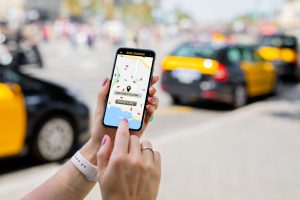Lawyers for two large “gig” employers want California’s worker classification law declared unconstitutional by a federal appellate court, which they are lobbying to block its enforcement. 
The U.S. Court of Appeals for the Ninth Circuit is slated to hear arguments from attorneys for Uber and Postmates that that the state law that determines who is an “employee” and who is an “independent contractor” is irrational, treats similarly-situated workers and professions unfairly, and is discriminatory toward some tech-based employers like Uber, while exempting errand-based apps that use similar driver-courier models.
As our Los Angeles employment lawyers can explain, the law being targeted is A.B. 5. It is the provision under which a worker is considered an employee unless the hiring entity can prove it was an independent contractor relationship through the ABC test – a three-factor analysis that examines the control over which the hiring entity had over the worker. The California employee classification rule impacts thousands of workers in the so-called “gig economy.” Although they enjoy flexibility, they lack certain employer-covered legal protections, such as unemployment benefits, overtime, paid meal breaks, and workers’ compensation.
It’s unlikely that the Ninth Circuit’s final ruling will be the last word. Whatever the ultimate decision is likely to be appealed to the U.S. Supreme Court. That might be a smart gamble for the company’s especially, given the solidly conservative majority of the U.S. Supreme Court. The consensus by many California employment law attorneys is that deep-pocketed companies are essentially playing the long-game of establishing a virtual monopoly on taxiing services. Doing so gives them greater power to lobby for laws (including employment laws) that bend to their favor.
That’s why this case is one that states beyond California’s borders are watching closely. Its history is one that extends back a few years.
In 2018, the California Supreme Court issued its ruling in Dynamex Operations West, Inc. v. Superior Court of L.a. Cty. ex rel. Lee. That ruling is established that an independent contractor has the following traits:
- Is free from the hiring agent’s control/direction in performing the work.
- Performs work outside the usual course of the hiring entity’s business.
- Is customarily engaged in an independently-established occupation, established trade, or business of the same nature as the work they’re performing for the hiring entity.
The state legislature soon after codified that ruling into state law. California has some of the most protective employment laws on the books. A.B. 5 was amended the following year to exclude certain professions, such as photographers, home inspectors, and appraisers. There are over 100 exemptions.
Uber and Postmate sued, but a federal judge refused to block the law from going into effect. Now, it’s been appealed to the Ninth Circuit. If the state succeeds, it’s possible that other companies like Uber might shy away from pursuing similar claims in other states (like Massachusetts) with similar independent contractor classification tests. But if there is a challenge in another circuit, that increases the odds we’ll see this rise to the U.S. Supreme Court level.
Contact the employment attorneys at Nassiri Law Group, practicing in Newport Beach, Riverside and Los Angeles. Call 714-937-2020.
Additional Resources:
Uber Appeal of California Gig Classification Law at 9th Circuit, July 12, 2022, Bloomberg Law
More Blog Entries:
California Misclassification Lawsuit Settles for $16 Million, June 30, 2022, Los Angeles Employment Lawyer Blog
 Orange County Employment Lawyers Blog
Orange County Employment Lawyers Blog

